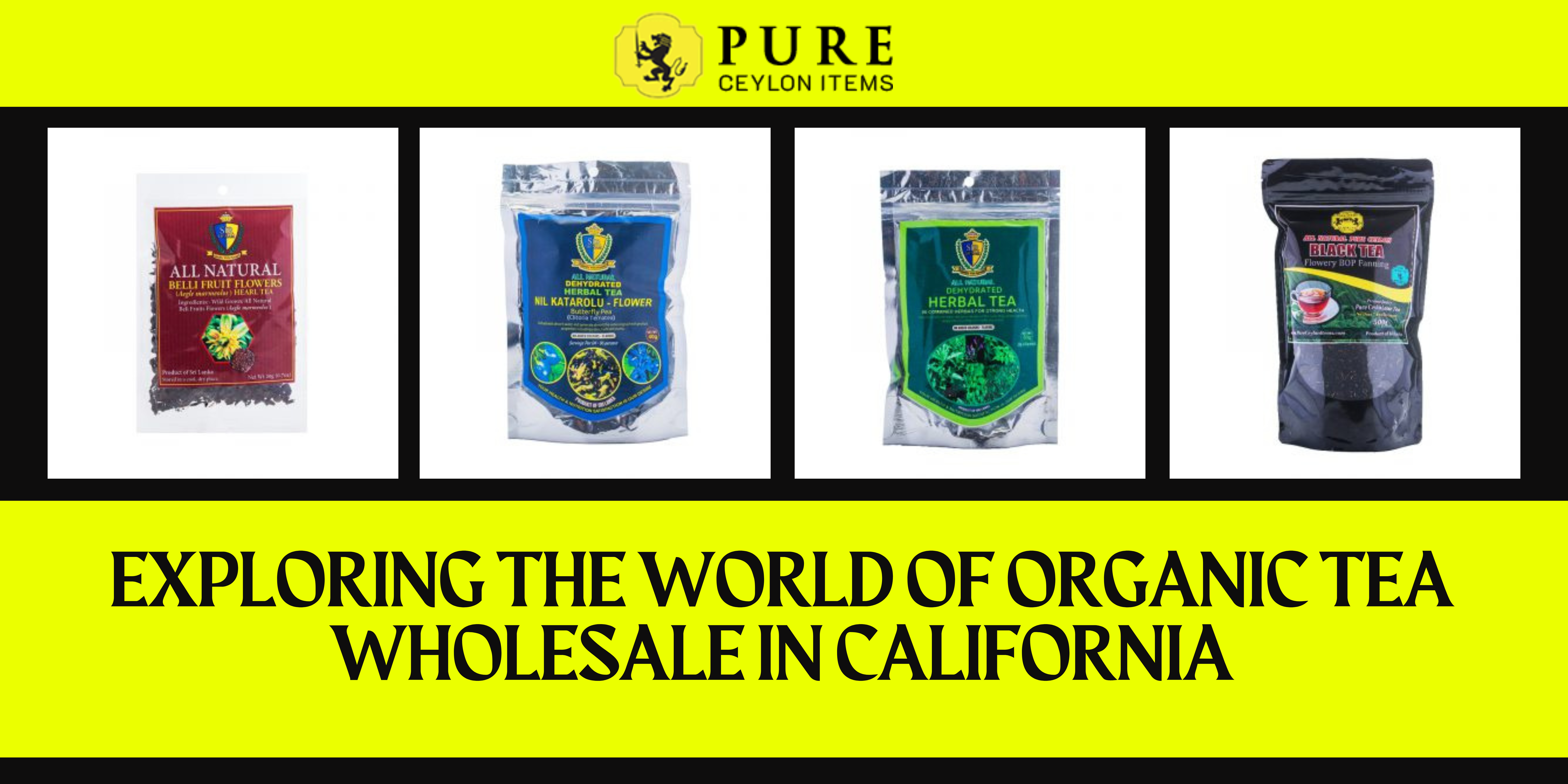Exploring the World of Organic Tea Wholesale in California

Introduction
Welcome to the lush introduction of our exploration into the captivating realm of Organic Tea Wholesale in California. Nestled amidst the scenic beauty of the Golden State, the organic tea industry has blossomed into a vibrant tapestry of flavors and traditions. Here, the term “Organic Tea Wholesale California” serves as our gateway to a world where sustainable cultivation, ethical sourcing, and a commitment to quality converge. As we embark on this journey, the aromatic promise of organic tea wafts through the air, enticing us to unravel the intricate threads that bind together the rich heritage, agricultural prowess, and market dynamics of California’s flourishing organic tea wholesale sector.
Historical Context of Organic Tea
Embark on a historical voyage through the lush fields and ancient traditions that lay the foundation for California’s thriving Organic Tea industry. This section unravels the narrative threads that connect us to the roots of organic tea farming, providing a rich understanding of its historical context.
A. Origins of Organic Tea Farming
The story begins in the mist-covered hills of ancient tea-growing regions, where the cultivation of tea dates back centuries. Explore the cultural significance of tea as it spread across continents, influencing societies and rituals. From the hills of China to the sprawling plantations of India, understand how organic tea emerged as a cherished beverage steeped in tradition.
B. Evolution in California’s Agricultural Landscape
Transitioning to California’s soil, witness the evolution of organic tea farming in a land known for its diverse crops. Discover the pioneers who introduced tea cultivation to California, adapting ancient practices to the state’s unique climate and terrain. From experimental plantations to the establishment of sustainable farming methods, trace the growth of organic tea in this dynamic agricultural landscape.
As California’s agricultural history intertwines with the global narrative of tea, the Historical Context of Organic Tea becomes a captivating tale of adaptation, innovation, and the enduring allure of this ancient beverage.
The Organic Tea Market in California
California, with its vibrant culture and health-conscious population, stands at the forefront of the organic tea movement. This section unravels the intricate threads that compose the tapestry of the Organic Tea Market in the Golden State.
A. Current Market Trends
California’s organic tea market is a dynamic landscape, influenced by evolving consumer preferences and global wellness trends. From the bustling streets of San Francisco to the serene shores of Malibu, tea enthusiasts are seeking more than just a beverage – they crave an experience. The market reflects a shift towards premium, handcrafted blends, emphasizing quality over quantity. Whether it’s the bustling artisanal tea shops in Los Angeles or the quaint farmers’ markets in Napa Valley, the demand for unique and ethically sourced teas is on the rise.
B. Consumer Preferences and Demands
In a state known for its emphasis on healthy living, consumers are increasingly turning to organic tea for its perceived health benefits and eco-friendly footprint. Californians value transparency in the sourcing process, demanding teas that are not only organic but also ethically and sustainably produced. From the bustling urban centers to the tranquil suburbs, the demand for diverse tea varieties, including herbal infusions and rare blends, is creating opportunities for both established and emerging players in the market.
With a rising awareness of the environmental impact of consumer choices, many tea enthusiasts in California are becoming more discerning, seeking out teas that align with their values. This shift is not merely a trend but a lifestyle choice, influencing purchasing decisions and reshaping the organic tea market’s landscape.
As we navigate the contours of California’s Organic Tea Market, it becomes evident that the intersection of health consciousness, environmental sustainability, and a thirst for unique experiences is propelling the market into an exciting era of growth and innovation. The next sections will further explore the nuances of this thriving market, from the benefits of organic tea to the intricacies of cultivation and harvesting amidst California’s diverse agricultural backdrop.
Benefits of Organic Tea
In the enchanting world of organic tea, the benefits extend far beyond the delightful sips that tantalize our taste buds. Let’s unravel the layers of goodness that make organic tea a beacon of well-being and a champion of environmental sustainability.
A. Health Benefits
- Antioxidant Richness: Organic tea, being free from synthetic pesticides and chemicals, retains a higher concentration of antioxidants. These compounds play a crucial role in neutralizing harmful free radicals, contributing to overall health.
- Boosted Immunity: The natural cultivation practices of organic tea result in leaves that are not only flavorful but also packed with immune-boosting properties. Regular consumption can fortify the body’s defenses against common illnesses.
- Heart Health: Studies suggest that the consumption of organic tea may contribute to cardiovascular health. Compounds like catechins have been linked to lower cholesterol levels and improved heart function.
- Weight Management: Organic tea, particularly green tea, is often associated with supporting weight management efforts. It can boost metabolism and aid in the natural process of burning calories.
- Reduced Caffeine Jitters: Organic teas, especially herbal infusions, offer a caffeine-free alternative to traditional teas. This allows tea enthusiasts to enjoy the ritual of tea without the potential jitters associated with excessive caffeine intake.
B. Environmental Sustainability
- Chemical-Free Cultivation: One of the primary distinctions of organic tea lies in its cultivation without synthetic pesticides and fertilizers. This not only ensures the purity of the tea but also prevents the contamination of soil and water sources.
- Biodiversity Preservation: Organic tea farms often prioritize biodiversity by avoiding monoculture. This approach supports a healthier ecosystem, promoting the natural balance of flora and fauna.
- Soil Health: The absence of chemical additives in organic tea farming helps maintain the fertility and structure of the soil. This sustainable practice fosters long-term agricultural viability.
- Water Conservation: Organic tea farms tend to employ water-conservation practices, minimizing water usage and mitigating the environmental impact associated with conventional farming.
- Community Well-Being: By embracing organic farming, tea producers contribute to the overall well-being of local communities. This includes providing healthier working conditions for laborers and fostering a more sustainable and ethical supply chain.
In essence, the benefits of organic tea transcend the individual cup, intertwining health and environmental stewardship. Choosing organic tea is not just a preference; it’s a conscious decision to embrace a healthier lifestyle while nurturing the planet we call home.
Cultivation and Harvesting
A. Organic Farming Practices
Embark on a journey through the lush fields of California, where the cultivation of organic tea is an art form. Organic farming practices prioritize the use of natural inputs and eschew synthetic chemicals. Explore how farmers employ composting, crop rotation, and natural pest control to nurture tea plants in a harmonious and sustainable ecosystem.
1. Soil Enrichment
Uncover the secrets of enriching the soil naturally, fostering a nutrient-rich environment for tea plants to thrive. From cover crops that prevent erosion to composting techniques that enhance soil fertility, organic farmers in California employ time-honored methods to cultivate the healthiest tea leaves.
2. Pest Management
Delve into the world of natural pest management, where beneficial insects and companion planting play key roles in keeping tea plantations free from harmful pests. Discover how organic farmers strike a delicate balance, protecting their crops without resorting to synthetic pesticides.
3. Sustainable Irrigation
Explore the sustainable irrigation practices adopted by tea farmers in California. From rainwater harvesting to efficient drip irrigation systems, discover how water conservation is a top priority in the cultivation of organic tea.
B. Unique Challenges in California
Unravel the challenges specific to cultivating organic tea in California, a region known for its diverse climate and terrain. From navigating water scarcity issues to addressing climate variability, organic tea farmers in the Golden State employ innovative solutions to overcome these hurdles.
1. Climate Variability
California’s diverse climates pose challenges for tea cultivation. Explore how farmers adapt their practices to cope with fluctuations in temperature, rainfall, and humidity, ensuring a consistent and high-quality tea yield.
2. Water Scarcity Solutions
In a state frequently grappling with water scarcity, discover the inventive solutions employed by organic tea farmers. From adopting drought-resistant tea varieties to implementing efficient water management practices, California’s tea cultivation navigates the delicate balance between productivity and resource conservation.
3. Organic Certification Challenges
Unveil the intricacies of obtaining and maintaining organic certifications in California. Learn how farmers navigate the stringent requirements, ensuring that their tea meets the highest standards of purity and environmental responsibility.
Cultivation and harvesting are not merely agricultural processes but a harmonious dance between nature and the expertise of California’s organic tea farmers. As we explore the fields where tea leaves sway in the gentle breeze, we witness the dedication and innovation that define the cultivation and harvesting practices in this thriving industry.
Marketing Strategies for Organic Tea Wholesalers
In the dynamic landscape of organic tea wholesale, effective marketing strategies play a pivotal role in establishing a brand, reaching consumers, and sustaining growth. Here’s an in-depth exploration of marketing strategies tailored for organic tea wholesalers in California:
A. Online Platforms
- E-Commerce Presence: Establish a robust online presence through dedicated e-commerce platforms. Create a user-friendly website showcasing the variety and quality of your organic tea products.
- Social Media Marketing: Leverage popular social media channels such as Instagram, Facebook, and Twitter to engage with a broader audience. Share visually appealing content, customer testimonials, and updates on new tea blends.
- Content Marketing: Develop engaging and informative content on your website, including blog posts, articles, and videos. Educate consumers about the benefits of organic tea, share brewing tips, and highlight the unique aspects of your products.
- Email Marketing Campaigns: Build and maintain a mailing list to keep customers informed about promotions, new arrivals, and educational content. Craft compelling email campaigns to nurture customer relationships and encourage repeat business.
B. Collaborations with Local Businesses
- Retail Partnerships: Forge partnerships with local grocery stores, health food stores, and specialty tea shops. Ensure that your organic tea products are prominently displayed, and consider offering exclusive blends for each partner.
- Café and Restaurant Tie-Ups: Collaborate with cafes and restaurants to feature your organic teas on their menus. Offer training sessions for staff on the unique characteristics of your teas to enhance customer recommendations.
- Community Events and Farmers’ Markets: Participate in local community events and farmers’ markets to connect directly with consumers. Set up tasting booths, share your brand story, and offer special promotions to attract new customers.
- Educational Workshops: Organize workshops or seminars on the health benefits of organic tea. Collaborate with health and wellness experts to create informative sessions, positioning your brand as a thought leader in the organic tea space.
C. Sustainability as a Marketing Tool
- Green Packaging Initiatives: Emphasize eco-friendly packaging practices. Highlight the use of recyclable or biodegradable materials, reinforcing your commitment to sustainability.
- Carbon Neutral Operations: Offset carbon emissions associated with production and distribution. Communicate these efforts transparently to environmentally conscious consumers.
- Partnerships with Conservation Organizations: Collaborate with environmental NGOs or conservation groups. Communicate shared values through co-branded initiatives, fostering a positive brand image.
- Educate Consumers: Use marketing channels to educate consumers about the environmental impact of choosing organic tea. Emphasize how their purchasing decisions contribute to a healthier planet.
By integrating these marketing strategies, organic tea wholesalers in California can not only elevate their brand presence but also contribute to a sustainable, thriving industry that resonates with conscious consumers.
Conclusion
In conclusion, the exploration of Organic Tea Wholesale in California is not just a journey through flavors and traditions; it’s an ode to sustainability and a commitment to quality at pureceylonitems.com. As we navigate the lush landscapes of California’s organic tea farms, pureceylonitems.com stands as a beacon of excellence, offering a curated selection of premium organic teas. From the verdant fields to the conscientious hands of farmers, every step in the supply chain is a testament to the dedication of pureceylonitems.com to the authentic essence of organic tea. With a focus on quality assurance, sustainability, and a deep-rooted passion for the art of tea, this platform emerges as a trusted destination for those seeking the finest Organic Tea Wholesale in California. At pureceylonitems.com, the journey doesn’t end with a purchase; it continues with each steep, fostering a connection between consumers and the rich heritage of organic tea cultivation in the heart of California.
Frequently Asked Questions (FAQs)
Q1. Why is organic tea pricier than conventional tea?
Answer: Organic tea is often more expensive due to rigorous farming practices, strict certifications, and a commitment to sustainability, all contributing to higher production costs.
Q2. How can retailers verify the authenticity of organic tea?
Answer: Retailers should source from certified wholesalers, verify compliance with California regulations, build relationships with trusted suppliers, and request documentation of organic certifications for authenticity.
Q3. Are there any risks associated with organic tea cultivation?
Answer: While generally safe, some risks in organic tea cultivation may include pests and diseases. However, these are typically managed using natural and organic methods, minimizing risks compared to conventional farming practices.


 Previous Post
Previous Post


